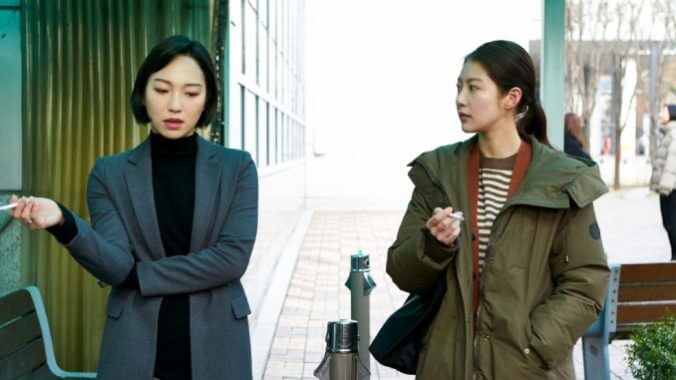Aloners Is a Poignant, Scant Portrait of Modern Individualism

Jina (Gong Seung-yeon) is a loner—if the title of the film, Aloners, was any indication. Though the pluralization is a bit misleading. Jina is the only character in Hong Sung-eun’s directorial debut who seems allergic to others’ company. The top employee at her credit card call center job, Jina bristles at all other human interaction. This includes her father (Park Jeong-hak), who cheated on and divorced her recently deceased mother two decades prior, but fell back into her mother’s good graces in the past few years. Jina spends most of her time in her cavernous bedroom, the only furnished portion of her otherwise completely barren apartment, with the television on. She eats lunch alone with her headphones in; most of the time she’s out in public, those little white buds are cocooned in her ears. When her boss instructs her to train a new caller—or else—Jina can’t comprehend anything she’d like to do less.
For the bulk of Aloners—a breezy, 90-minute character study initially released in South Korea in 2021—Jina remains so frigidly misanthropic and anti-social that she’s hard to latch onto as our protagonist. In spite of the given reasoning behind her detachment—her move from home, her mother’s death, the pandemic—she is so removedly cruel to others that she is nearly impossible to empathize with, and navigating the film alongside her is mostly maddening. Watching the film, it’s hard not to scream at Jina to just be nice to the people around her, but I suppose that partly speaks to the masterful performance given by Gong. Gong, while aggravating, is subtle and brilliant. And Hong’s direction, coupled with the cinematography from Youngki Choi and production design by Kim Do-eun, produces a world that is as colorless and bleak as Jina’s attitude.
And when Jina’s overly-friendly neighbor turns up dead in his apartment, crushed by a stack of porno magazines and rotted for a week, Jina is rattled but remains mostly unfazed—at first. Though still reclusive, she begins more regularly monitoring her widowed father on a live feed from a wireless camera she installed in her parents’ home. Her interactions with the eager trainee at her job, Sujin (Jung Da-eun), become even more cold and avoidant, as if lashing out against Sujin’s friendly disposition due to insecurity and resentment from the isolated lifestyle she created for herself.
-

-

-

-

-

-

-

-

-

-

-

-

-

-

-

-

-

-

-

-

-

-

-

-

-

-

-

-

-

-

-

-

-

-

-

-

-

-

-

-








































